"How Can We Better Help Prevent People From Fainting ?" [~click]
.
.
.
COLLAPSED = FAINTED not DIED
OLIVIA RABY
let's CHANGE the old 'no fuel' CPR ...
'CPR' should include a spoon full of honey
NOW! NOW!! NOW!!!
OLIVIA RABY
 Robert Manning, from Cratloe, in Ireland was a secondary school pupil. The eldest of three boys, he was full of enthusiasm for life in a quiet, unassuming way. He was 6’3” in height and was supposedly very healthy. He was an avid oarsman and also loved karate and rugby. His friends looked up to him as he could defuse any tricky situation or pass a funny “tongue-in-cheek” comment which people found endearing. In his memory, a friend released a tribute single ‘Re-Unite’ for the Robert Manning Fund, which was donated to CROI (the West of Ireland Cardiology Foundation).
Robert Manning, from Cratloe, in Ireland was a secondary school pupil. The eldest of three boys, he was full of enthusiasm for life in a quiet, unassuming way. He was 6’3” in height and was supposedly very healthy. He was an avid oarsman and also loved karate and rugby. His friends looked up to him as he could defuse any tricky situation or pass a funny “tongue-in-cheek” comment which people found endearing. In his memory, a friend released a tribute single ‘Re-Unite’ for the Robert Manning Fund, which was donated to CROI (the West of Ireland Cardiology Foundation).
Date of death: August 2002
Age at time of death: 16
Prior symptoms detected: None
Circumstances of death: Robert was playing rugby with his family in the back garden. As he went to retrieve the ball he said “Oh no” and lay down on the grass. His family tried to revive him using CPR but to no avail.
Diagnosed cause of death: Because all of Robert’s organs were undamaged, no cause of death was found, leading to a diagnosis of SADS.
OLIVIA RABY
Catherine Keane, from Lisheenfurror, Kilkee, in Ireland, was a Pupil in fifth class at Carrigaholt National School. She enjoyed football, swimming and hurling, but the love of her life was horse-riding. From a family of two children, she was a very hard-working, diligent little girl, who was great company and always eager to please people.
Date of death: November 2003
Age at time of death: 10
Prior symptoms detected: Just over a year prior to her death, Catherine fainted and she was referred to hospital by her doctor who had detected tachycardia. The appropriate tests to detect cardiac condition were not carried out at hospital.
Circumstances of death: Catherine was at her riding school when she slumped on her pony, and despite efforts by her father and riding instructors to administer CPR, she could not be revived.
Diagnosed cause of death: The post-mortem reported that she had a massive brain seizure, but the results of an inquest are still awaited, and family investigations indicate that the cause of death was cardiac.
COLLAPSED = FAINTED not DIED
MURPHY
&
MIKLOS FEHER
&
OLIVIA RABY
&
DANIEL JARQUE
BUT ... IT IS OTHER THAN CLEAR WHETHER MIKLOS FEHER, ROBERT MANNING & CATHERINE KEANE ... HAD SIMPLY FAINTED FROM
aka HYPOglycemia & HYPOketosis & HYPOxemia [commonly associated with cardiac related seizures] and that, in the apparent [see video / text] absence of a rapid SPOON FULL OF HONEY the questionable CPR procedure 'received' had EXHAUSTED ... MIKLOS FEHER, ROBERT MANNING & CATHERINE KEANE to death ... all for the lack of GLUCOSE EG via a GLUCAGON injection and the questionable medical practice of treating Someone who faints [ie a COMA being a natural safety mechanism of a fuel exhausted body] ...
apparently without providing any treatment for
a lack of GLUCOSE or DEHYDRATION
MURPHY
&
MIKLOS FEHER
&
OLIVIA RABY
&
DANIEL JARQUE
http://www.ManchesterEveningNews.co.uk/news/s/1051084_girl_dies_in_school_game
http://Express.Lineone.net/posts/view/45997/Girl-14-dies-of-a-heart-attack-playing-rounders
http://www.NutraIngredients-USA.com/news/ng.asp?n=85729-red-bull-federal-institute-for-risk-assessment-energy-drinks-taurine-caffeine
http://www.SalfordAdvertiser.co.uk/news/s/1051789_parents_mourn_shock_death_of_sporty_teenager
http://www.Telegraph.co.uk/news/uknews/2047319/Teenager-dies-in-school-game-of-rounders.html
http://www.ManchesterEveningnews.co.uk/news/s/1051387_tributes_flood_in_for_olivia
http://www.aipsmedia.com/index.php?page=news&cod=3171&tp=n [Sebastian Faißt]
http://www.TheCormacTrust.cOM/sudden-cardiac-death-ireland
.
.
.
ARMAGH
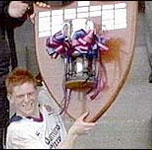 John McCall, from Collone, near Armagh City, was an A-Level pupil at Armagh Royal School. He hoped to go on to study architecture at Queen’s University, Belfast.
John McCall, from Collone, near Armagh City, was an A-Level pupil at Armagh Royal School. He hoped to go on to study architecture at Queen’s University, Belfast.
Playing in the flanker position, he was one of the most promising young rugby players in Ireland. On St Patrick’s Day 2004 he captained his school to its first victory in the Ulster Senior Schools’ Cup in 27 years, and he was selected to play for Ireland in the World Under-19 Rugby Cup just over a week later. It was while playing in that competition that John met his tragic death.
Date of death: March 2004
Age at time of death: 18
Prior symptoms detected: None
Circumstances of death: John collapsed and died while playing for the Ireland under-19 team against New Zealand in Durban, South Africa
Diagnosed cause of death: Viral cardiomyopathy
Diagnosed cause of death: The post-mortem report said sudden arrhythmic death; it has since been found that Brughada Syndrome is in the family.
Catherine Hand, from Lurgan, was a sales assistant. She was very physically active, and took a lot of exercise.
Date of death: April 2004
Age at time of death: 20
Prior symptoms detected: Catherine had suffered a blackout and palpitations, but doctors did not seem to suspect a serious cardiac condition.
Circumstances of death: Catherine died in her sleep
Diagnosed cause of death: Cardiac Arrhythmia
Rory McGee, from Dorsey, was employed as an Engineer in FM Systems, Newry.
He was a former pupil of St Colman’s College, Newry College of Further Education and a graduate of University of Ulster Jordanstown. He was married to Sabrina, who gave birth to their baby daughter Gemma, just 8 weeks before his death. He was a founder member of Dorsey Emmet’s GAC in 2000, and worked as club secretary. He received the award for Club Person of the Year in 2002. Rory was a kind and loving person who was liked by everyone.
Date of death: March 2005
Age at time of death: 26
Prior symptoms detected: None
Circumstances of death: Rory died suddenly at home at around 11 pm
Diagnosed cause of death: (Awaiting Coroner’s report)
ANTRIM
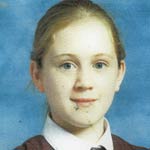 Ciara Agnew, from Derriaghy, was a pupil at St Dominic’s High School, Belfast, and was one of five children. She was a normal fun-loving girl, who was full of life and always seemed healthy. She loved playing music and enjoyed swimming and netball at school.
Ciara Agnew, from Derriaghy, was a pupil at St Dominic’s High School, Belfast, and was one of five children. She was a normal fun-loving girl, who was full of life and always seemed healthy. She loved playing music and enjoyed swimming and netball at school.
Date of death: February 2002
Age at time of death: 14
Prior symptoms detected: None
Circumstances of death: Ciara was on the bus home from school, laughing and joking, when she collapsed on the seat suddenly and died.
Diagnosed cause of death: “unascertained”, but suspected sudden cardiac death
 Nicholas Collins, from Ballinderry, near Lisburn, had just finished his GCSE examinations and started a Media Studies course at Belfast Institute of Further & Higher Education. He was very fit and played basketball for a club in Lisburn.
Nicholas Collins, from Ballinderry, near Lisburn, had just finished his GCSE examinations and started a Media Studies course at Belfast Institute of Further & Higher Education. He was very fit and played basketball for a club in Lisburn.
Date of death: November 1998
Age at time of death: 16
Prior symptoms detected: Seven weeks before he died, Nicholas developed a throat-cold and an irregular temperature, and was taken into hospital. It was then found that he had an endocarditis, possibly due to a viral infection. He got over this, but his condition caused an auto-immune reaction, from which he never improved.
Circumstances of death: Nicholas died in hospital
Diagnosed cause of death: Viral Endocarditis
DERRY
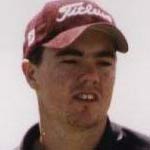 Aaron Lundy, from Portstewart, was a very talented all-round sportsman. He won the Irish Under-15 Championship trophy in golf and was selected to play for Ulster at 16. At 17 he won the Irish Daily Mail Championship and in the same year the British Daily Mail Boys’ Championship in the USA. He was then selected for the Irish national boys’ squad, playing off a scratch handicap. A very fit young man, he also enjoyed participating in basketball, cross-country running and football. Aaron’s father, John, is now the Northern Ireland representative of the CRY group.
Aaron Lundy, from Portstewart, was a very talented all-round sportsman. He won the Irish Under-15 Championship trophy in golf and was selected to play for Ulster at 16. At 17 he won the Irish Daily Mail Championship and in the same year the British Daily Mail Boys’ Championship in the USA. He was then selected for the Irish national boys’ squad, playing off a scratch handicap. A very fit young man, he also enjoyed participating in basketball, cross-country running and football. Aaron’s father, John, is now the Northern Ireland representative of the CRY group.
Date of death: September 1999
Age at time of death: 19
Prior symptoms detected: Aaron was diagnosed as having Wolff Parkinson White syndrome a couple of years earlier but was told not to worry about it.
Circumstances of death: Aaron died two hours after a football game.
Diagnosed cause of death: Wolff Parkinson White syndrome
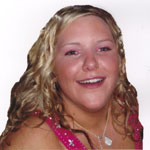 Marcella Doherty, from Bellaghy, worked as a hairdresser in her home village, and hoped to expand her business to include a beauty salon in the near future. She loved driving and had an ambition to buy a red Audi A4. She took a lot of exercise in the nine months before her death, and on one night a week before she experienced palpitations she completed 40 lengths of the swimming-pool.
Marcella Doherty, from Bellaghy, worked as a hairdresser in her home village, and hoped to expand her business to include a beauty salon in the near future. She loved driving and had an ambition to buy a red Audi A4. She took a lot of exercise in the nine months before her death, and on one night a week before she experienced palpitations she completed 40 lengths of the swimming-pool.
Date of death: September 2005
Age at time of death: 24
Prior symptoms detected: None – a week before her death, Marcella collapsed and was taken to hospital. After some brief tests, she was discharged a short time later. Despite great anxiety over her racing heart and several frantic requests to be seen, she could not get a private appointment with a cardiologist that week.
Circumstances of death: Marcella died with a watch in her hand, taking her own pulse, on a Sunday, as she waited to go to the doctor the following morning to make an appointment to see a cardiologist.
Diagnosed cause of death: Arrhythmogenic Right Ventricular Cardiomyopathy / Dysplasia (ARVC/D)
DOWN
 Mary Mooney, from Newry, had just completed Beauty Therapy examinations at Newry Institute of Further & Higher Education, and was about to embark on a course of Aromatherapy. She was naturally fit and liked to take exercise. Her family has set up Mary’s
Mary Mooney, from Newry, had just completed Beauty Therapy examinations at Newry Institute of Further & Higher Education, and was about to embark on a course of Aromatherapy. She was naturally fit and liked to take exercise. Her family has set up Mary’s
Date of death: February 2003
Age at time of death: 18
Circumstances of death: Mary was found dead in her bed in the morning, with her left hand up in the air, as if she had been trying to reach out. It was four years to the day that her father had died from a heart attack.
Prior symptoms detected: None – she had felt palpitations and shaking during the previous two years, and had lost weight, but no cardiac conditions had been detected.
Diagnosed cause of death: “sudden adult death syndrome”
DONEGAL
Paul Cavanagh, from Moville, was a fisherman, who spent long hours out at sea. He had a big interest in cars. He had also played Gaelic football and soccer for local teams, and golf in his spare time.
Date of death: May 2004
Age at time of death: 20
Prior symptoms detected: None (he had fallen out of his boat bunk-bed five months earlier, but all tests were inconclusive)
Circumstances of death: Paul was found dead in his bed one afternoon
Diagnosed cause of death: officially stated as “epileptic-type seizure, brought on by a chest infection”, but he had no history of epilepsy, and his death showed various characteristics of sudden cardiac death.
FERMANAGH
 Richard Martin, from Cabra, near Irvinestown, was a pupil at Portora Royal School, Enniskillen. The youngest of four brothers, he was a model pupil, having got four As in his AS Level examinations, and he hoped to study Medicine at university. He was also an able sportsman, which he showed by earning his place on the school rugby first team within weeks of taking up the game. He was very active in various other activities, including those of the Boys’ Brigade, of which he was a member.
Richard Martin, from Cabra, near Irvinestown, was a pupil at Portora Royal School, Enniskillen. The youngest of four brothers, he was a model pupil, having got four As in his AS Level examinations, and he hoped to study Medicine at university. He was also an able sportsman, which he showed by earning his place on the school rugby first team within weeks of taking up the game. He was very active in various other activities, including those of the Boys’ Brigade, of which he was a member.
Date of death: November 2004
Age at time of death: 17
Prior symptoms detected: Doctors identified a congenital heart problem and advised Richard to give up rugby, which he did, just before the school team went on tour to Australia.
Circumstances of death: Richard collapsed while playing tennis, and died
Diagnosed cause of death: Wolff Parkinson White syndrome
MONAGHAN
Éamon McElroy, Monaghan, was a mechanic. He was married with three children, and he kept fit regularly.
Date of death: January 2005
Age at time of death: 41
Prior symptoms detected: none
Circumstances of death: Éamon collapsed and died while training.
Diagnosed cause of death: Hypertrophic cardiomyopathy
TYRONE
Lee Turkington, from Dungannon, was a pupil at Dungannon Royal School. Lee enjoyed playing Rugby at school level and enjoyed life. He had been diagnosed with Hypertrophic Cardiomyopathy after his mother, Dorothy, died of the same condition in 1982, at the age of 27. Dorothy also lost a brother in 1958 at age 16. He died while running up a hill, at the family farm in Stewartstown. His diagnosis only came to light when Dorothy died and both post-mortems where looked at. As a result of Dorothy’s death, it was found that several other members of the family had the same condition of Hypertrophic Cardiomyopathy.Date of death: 1992
Age at time of death: 16
Prior symptoms detected: Lee had been diagnosed with the condition.
Circumstances of death: Lee collapsed and died in the school playground whilst chasing a ball.
Diagnosed cause of death: Hypertrophic Cardiomyopathy
Jonathan Scott, from Dungannon, was a production Manager with Moy Park. A close relative of the family of Lee Turkington, he had the same condition as his deceased relatives. He was engaged to be married and it was five weeks to his wedding when he died. He also had a daughter. He was always on the go and enjoyed life to the full, whether at work or in his family & social life. He competed at Rugby at school level, and enjoyed playing and watching football and was an avid Manchester United Fan.
Date of death: 2002
Age at time of death: 25
Prior symptoms detected: Jonathan had been diagnosed with Hypertrophic Cardiomyopathy and had an Implantable Defibrillator fitted to prevent sudden death.
Circumstances of death: Jonathan died whilst getting his implantable defibrillator replaced.
Diagnosed cause of death: Hypertrophic Cardiomyopathy
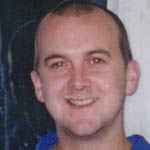 Gary Duffin, from Coalisland, was a joiner with a local construction firm. He was one of five children in the family, and he was engaged to be married in the summer. He played hurling for the Naomh Colmcille club, and also had a keen interest in football.
Gary Duffin, from Coalisland, was a joiner with a local construction firm. He was one of five children in the family, and he was engaged to be married in the summer. He played hurling for the Naomh Colmcille club, and also had a keen interest in football.
Date of death: March 2005
Age at time of death: 26
Prior symptoms detected: None – he had previously been found to have a racing heart while in hospital, but this was attributed to an accident.
Circumstances of death: He collapsed and died in his new house one evening while doing household chores.
Diagnosed cause of death: Brughada Syndrome
CONNACHT
LEITRIM
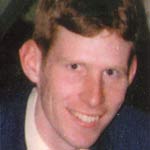 Gerard Gallagher, from Kiltyclogher, had just finished his final examinations at the Institute of Technology, Sligo. On the day that he died he had got the news that he had been appointed to a job in Dublin. He played Gaelic football for Glenfarne club, and soccer for Manorhamilton Rangers. He took part in athletics when he was younger, and was always quite fit.
Gerard Gallagher, from Kiltyclogher, had just finished his final examinations at the Institute of Technology, Sligo. On the day that he died he had got the news that he had been appointed to a job in Dublin. He played Gaelic football for Glenfarne club, and soccer for Manorhamilton Rangers. He took part in athletics when he was younger, and was always quite fit.
Date of death: July 1999
Age at time of death: 25
Circumstances of death: Gerard collapsed and died during a Gaelic football league game.
Prior symptoms detected: None – but the post-mortem found that he had had a heart attack three weeks previously.
Diagnosed cause of death: A growth on the left ventricle of his heart – which he had had from the time of his birth.
MAYO
 Robert Finnerty, from Ballintubber, Claremorris, had recently qualified as a carpenter and had just gone to London to work for the summer. He planned to go to Australia with friends in the autumn, and intended to undergo a course in the use of Automated External Defibrillator on his return. He qualified as a water safety instructor and went on to instruct kids to be lifeguards, He also taught as a swimming instructor with a local swimming club. He was very passionate about water-safety, and had a way with teaching it. It was something he did in his free time. He also played indoor soccer.
Robert Finnerty, from Ballintubber, Claremorris, had recently qualified as a carpenter and had just gone to London to work for the summer. He planned to go to Australia with friends in the autumn, and intended to undergo a course in the use of Automated External Defibrillator on his return. He qualified as a water safety instructor and went on to instruct kids to be lifeguards, He also taught as a swimming instructor with a local swimming club. He was very passionate about water-safety, and had a way with teaching it. It was something he did in his free time. He also played indoor soccer.
Date of death: June 2004
Age at time of death: 22
Prior symptoms detected: None – Robert had complained of chest pains just over six weeks earlier, and went to the doctor, but no cardiac condition was detected.
Circumstances of death: Robert was working on the building-site of an extension to a hospital in London. One morning he felt unwell at work, took a break, and was asked whether he would like some aspirin. He declined, saying that he would be okay, but moments later he collapsed and died. Within minutes efforts were made to revive him, but were unsuccessful.
Diagnosed cause of death: microcardial ischaemia, due to or as a consequence of arrhythmia
ROSCOMMON
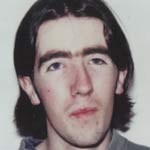 Shane Kennedy, from Ballaghadereen, was a student of Information Technology at the National University of Ireland, Galway (formerly U.C.G.). He had just completed his first year on that course. He was a fit, healthy young man, who played golf and soccer occasionally, and won many medals for running in local Community Games when he was younger. He was also a big fan of Liverpool soccer team and loved listening to music.
Shane Kennedy, from Ballaghadereen, was a student of Information Technology at the National University of Ireland, Galway (formerly U.C.G.). He had just completed his first year on that course. He was a fit, healthy young man, who played golf and soccer occasionally, and won many medals for running in local Community Games when he was younger. He was also a big fan of Liverpool soccer team and loved listening to music.
Date of death: July 1998
Age at time of death: 20
Prior symptoms detected: None
Circumstances of death: Shane was helping to paint a room in his family home, and then went down to the kitchen, where he told his parents he felt dizzy. He sat down, but his head fell forward onto the table, and his father held him. A nurse and doctor were both on the scene within five minutes but they could not revive him.
Diagnosed cause of death: Myocarditis, most probably of viral origin – but no virus was isolated when tissue samples were sent to a virus reference laboratory.
LEINSTER
DUBLIN
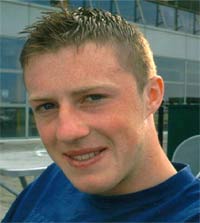
Robbie Simpson, from Monkstown, was an Arts undergraduate at University College Dublin. The youngest of three brothers, he was an active, sports-loving young man, who especially enjoyed swimming, cycling and soccer, as well as socialising. Towards the end of his life he remained brave and optimistic in the face of grave illness. His family, his friends in conjunction with the Mater Hospital, has been inspired to inaugurate a
Date of death: May 2005
Age at time of death: 19
Prior symptoms detected: Robbie was detected as having a dilated (enlarged) heart, and he was the first person in Ireland to be given an artificial external heart-pump (funded by the Irish Transplants Patients Association).
Circumstances of death: Despite the support of his family, and the innovative and expert care of the Mater Misericordiae University Hospital in Dublin, Robbie died in hospital, where he had spent his last 8 weeks.
Diagnosed cause of death: Robbie died from the above condition – dilated cardiomyopathy – which was a genetic condition in his family.
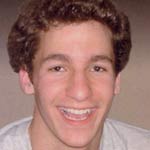 Darius Vasseghi, Dublin, was a student of Electronic Engineering at University College Dublin. Having lived previously in Iran and France, he was a person of diverse cultural influences and was fluent in six languages. He was a champion fencer and was national champion in both countries several times, representing them in many international competitions, including two world championships. On his death he was captain of UCD team and member of the Irish squad. He was also an accomplished clarinet player, a woodwork marquetry master, computer expert and tennis player. Since Darius’ death, his mother, Mary, has been one of the main founders of the Irish Sudden Cardiac Death (in the young) Support Group.
Darius Vasseghi, Dublin, was a student of Electronic Engineering at University College Dublin. Having lived previously in Iran and France, he was a person of diverse cultural influences and was fluent in six languages. He was a champion fencer and was national champion in both countries several times, representing them in many international competitions, including two world championships. On his death he was captain of UCD team and member of the Irish squad. He was also an accomplished clarinet player, a woodwork marquetry master, computer expert and tennis player. Since Darius’ death, his mother, Mary, has been one of the main founders of the Irish Sudden Cardiac Death (in the young) Support Group.
Date of death: 30 May 2005
Age at time of death: 18
Prior symptoms detected: (Only tiredness on effort as a child.)
Circumstances of death: Darius collapsed and died on his bathroom floor one morning
Diagnosed cause of death: Aorta Hypoplasia (narrowing of the aorta) and left ventricular hypertrophy
 Conor Martin, from Rialto, was a pupil completing his transition year at De La Salle School, Churchtown. He was an only child. A tall, well-built boy, he played rugby for his school and for the DLSP club, and was rarely ill. He was always smiling and cheerful. He was very interested in all kinds of music, from Luke Kelly to 2Pac. On the night prior to his death he had attended a school graduation ceremony.
Conor Martin, from Rialto, was a pupil completing his transition year at De La Salle School, Churchtown. He was an only child. A tall, well-built boy, he played rugby for his school and for the DLSP club, and was rarely ill. He was always smiling and cheerful. He was very interested in all kinds of music, from Luke Kelly to 2Pac. On the night prior to his death he had attended a school graduation ceremony.
Date of death: June 2005
Age at time of death: 16
Prior symptoms detected: None – he had once complained of feeling dizzy, but his family could only think that this was a flu symptom.
Circumstances of death: Conor died in his bedroom at about 10.30 a.m., soon after he had woken.
Diagnosed cause of death: “Sudden Adult Death Syndrome”
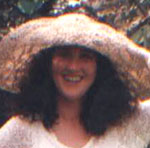 Cliona Murphy, from Raheny, worked as a personal assistant with a leading bank in the Irish Financial Services Centre. From an early age she was very sporty, taking part in school hockey, tennis and swimming. At 18 ‘wanderlust’ took her to the USA. She worked in Washington D.C. and California, and lived in New York City for several years. During a year’s stay in New Zealand and Australia her ambition led her to take up competitive sailing, and she excelled, qualifying for the Sydney to Hobart yacht-race in 1992. On her return to Ireland she joined Howth Yacht Club and raced in the Squib class. Cliona’s dream came true when she was invited onto the all-women’s crew in the ‘Around Ireland’ race 1993. She was very popular and a loyal friend to many. The Cardiomyopathy Support Group was founded in her memory.
Cliona Murphy, from Raheny, worked as a personal assistant with a leading bank in the Irish Financial Services Centre. From an early age she was very sporty, taking part in school hockey, tennis and swimming. At 18 ‘wanderlust’ took her to the USA. She worked in Washington D.C. and California, and lived in New York City for several years. During a year’s stay in New Zealand and Australia her ambition led her to take up competitive sailing, and she excelled, qualifying for the Sydney to Hobart yacht-race in 1992. On her return to Ireland she joined Howth Yacht Club and raced in the Squib class. Cliona’s dream came true when she was invited onto the all-women’s crew in the ‘Around Ireland’ race 1993. She was very popular and a loyal friend to many. The Cardiomyopathy Support Group was founded in her memory.
Date of death: June 1995
Age at time of death: 30
Prior symptoms detected: None
Circumstances of death: Cliona collapsed and died outside of her workplace on a warm afternoon.
Diagnosed cause of death: Hypertrophic Cardiomyopathy
Paul Stewart, Dublin, was the branch manager of a leading jewellery store in the city centre. He had previously worked in the management teams of various retail stores, and quickly gained respect as a competent leader and was equally well respected in his personal life. He was a young man with a passion for life. Having recently got married Paul decided to get in shape! He enjoyed meeting up with friends on a weekly basis to play a game of football. He was a keen supporter of Arsenal and Celtic and loved music. Since Paul’s death, his family and friends have been actively raising funds to purchase defibrillators for sports halls, football clubs, etc.
Date of death: September 2004
Age at time of death: 30
Prior symptoms detected: None
Circumstances of death: Paul collapsed and died suddenly while playing a game of football with friends.
Diagnosed cause of death: No anatomical cause of death established. Death Certificate states Sudden Adult Death Syndrome.
Lisa Murphy, from Ayrfield, worked as a dental nurse. She was the eldest of four children, and had a baby girl Chloe. Lisa was ostensibly healthy and fit and really enjoyed life; she was always making plans for nights out, foreign holidays, etc.
Date of death: January 2004
Age at time of death: 26
Prior symptoms detected: None
Circumstances of death: Lisa was out dancing one night when she fell. She had no pulse and efforts to revive her proved unsuccessful.
Diagnosed cause of death: “No anatomical cause found. Probably Arrhythmia.”
KILKENNY
Hugh Williams, from Gowran, had recently graduated from Dundee University, and was working as an architect in Dublin. The youngest of three children, he liked to keep fit by swimming, working out, playing tag rugby for the Tag Barbarians team and walking (he did a 50-mile hike in Scotland), although he was not involved in serious competitive sport. He and two friends were in the process of buying an old farmhouse in Co. Carlow, to renovate to his completed designs. This house was subsequently purchased and the renovations will be complete by September 2006.
Date of death: June 2005
Age at time of death: 23
Prior symptoms detected: None – he had fainted once three years previously and experienced a dizzy spell two months before he died, but had not reported these to a doctor or to his family.
Circumstances of death: Hugh collapsed and died on the sideline having played for just ten minutes in a tag rugby game.
Diagnosed cause of death: Cardiomyopathy
LAOIS
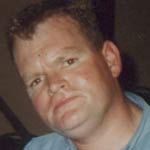 Brian Bergin, from Ballybrophy, Borris-in-Ossory, worked in construction, doing building and chimney repair work. He was one of a family of seven children, and was married in June 2001, one year prior to his death.
Brian Bergin, from Ballybrophy, Borris-in-Ossory, worked in construction, doing building and chimney repair work. He was one of a family of seven children, and was married in June 2001, one year prior to his death.
A very fit and competent hurler, he played for the Kilcotton club and was once on the Laois senior county hurling panel. He also played golf.
Date of death: June 2002
Age at time of death: 34
Prior symptoms detected: None
Circumstances of death: Brian was jogging on the local hurling field when he collapsed and died.
Diagnosed cause of death: Hypertrophic cardiomyopathy
LOUTH
 Gerard Leddy, from Collon, was a manager of a dairy farm, and was about to travel to England for a change of employment. It is possible that his family has had a possible history of conditions which cause sudden cardiac death.
Gerard Leddy, from Collon, was a manager of a dairy farm, and was about to travel to England for a change of employment. It is possible that his family has had a possible history of conditions which cause sudden cardiac death.
Date of death: October 1990
Age at time of death: 21
Prior symptoms detected: None
Circumstances of death: Gerard was found lying across his bed in the evening, having gone to bed early.
Diagnosed cause of death: (inconclusive – suspected arrhythmia)
Peter Brennan, from Dunleer, was a farmer and a very accomplished athlete. He won all-Ireland medals with Dunleer AC in Shot-Putt, Discus-Throwing, Hammer-Throwing competitions.
Date of death: July 1985
Age at time of death: 37
Prior symptoms detected: He had felt light pains in his chest, but had not been diagnosed with a heart condition.
Circumstances of death: Peter died suddenly while training with Dunleer AC between 7.30-8.00 p.m.
Diagnosed cause of death: Heart Attack
OFFALY
Date of death: January 1998
Age at time of death: 16
Prior symptoms detected: none
Circumstances of death:
Diagnosed cause of death: Hypertrophic Cardiomyopathy
WEXFORD
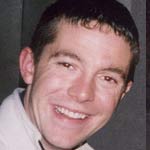 Noel Quill came from Johnstown, Castlebridge, near Wexford. He was the eldest of a family of four children, and he played Gaelic football for the local Shelmalier club. He had just got his Degree in Business Studies from Waterford Institute of Technology, and he was on the verge of many exciting things when he died. He commenced his first full time job the previous Monday with American company PFPC International in Drinagh, Wexford. He booked a holiday to Florida with a group of friends on Thursday, and bought a car on Friday evening. He was to be groomsman at his uncles wedding on Saturday - the day that he died.
Noel Quill came from Johnstown, Castlebridge, near Wexford. He was the eldest of a family of four children, and he played Gaelic football for the local Shelmalier club. He had just got his Degree in Business Studies from Waterford Institute of Technology, and he was on the verge of many exciting things when he died. He commenced his first full time job the previous Monday with American company PFPC International in Drinagh, Wexford. He booked a holiday to Florida with a group of friends on Thursday, and bought a car on Friday evening. He was to be groomsman at his uncles wedding on Saturday - the day that he died.
Date of death: 17 July 2004
Age at time of death: 22
Prior symptoms detected: None
Circumstances of death: Noel died in his sleep. On the previous evening he complained of feeling dizzy during a game of Gaelic football for his club and was substituted.
Diagnosed cause of death: Sudden Adult Death Syndrome in the absence of any positive cause.
Nicola Ryan, from Ardross, New Ross, was a pupil at St Mary’s Secondary School, New Ross. The second eldest of four children, she was a fit, healthy, beautiful young girl. She loved to play basketball and to swim, and she had never been seriously ill in her life.
Date of death: June 2002
Age at time of death: 14
Prior symptoms detected: None
Circumstances of death: Nicola died as she lay on the sofa one evening, at approximately 6.40 p.m. She was found by her older sister and all efforts to resuscitate her failed.
Diagnosed cause of death: “Sudden Adult Death Syndrome”
WICKLOW
 Darragh Kelly, from Greystones, was a student embarking on a Construction Engineering course at Dundalk Institute of Technology, having returned some months previously from travelling abroad. He was the eldest and only boy of four children in his family. He participated in a wide range of sports – he played soccer for Greystones and later Kilcoole; he excelled in Gaelic football and rugby at St. David’s Secondary School in Greystones, travelling to a schools international rugby tournament in Italy in 1999. He was also proficient at both swimming and sprinting.
Darragh Kelly, from Greystones, was a student embarking on a Construction Engineering course at Dundalk Institute of Technology, having returned some months previously from travelling abroad. He was the eldest and only boy of four children in his family. He participated in a wide range of sports – he played soccer for Greystones and later Kilcoole; he excelled in Gaelic football and rugby at St. David’s Secondary School in Greystones, travelling to a schools international rugby tournament in Italy in 1999. He was also proficient at both swimming and sprinting.
Date of death: 1 October 2003
Age at time of death: 21
Prior symptoms detected: None
Circumstances of death: Darragh collapsed and died in his room at about 8.30 in the evening. He was found by a housemate just 20 minutes after he had been speaking to his mother on the phone and told her that he felt a lot better, having followed her advice to stay in bed, take paracetamol and plenty of fluids. He had experienced flu-like symptoms for two days prior to his death; on the day he died he had complained of heart palpitations, but felt a lot better having slept. Darragh was getting dressed and collapsed onto the floor beside his bed.
Diagnosed cause of death: “sudden unexplained death in an adult”
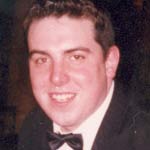 Richie Doyle, from Bray, was a sales rep. and a graduate of Dublin Institute of Technology. He was 6 feet 6 inches tall, and kept very fit – he was a very keen soccer player, he jogged and walked the dog regularly, and he was very careful about what he ate. Since his death his family has raised funds for the purchase and distribution of 14 defibrillators for local sports clubs and secondary schools.
Richie Doyle, from Bray, was a sales rep. and a graduate of Dublin Institute of Technology. He was 6 feet 6 inches tall, and kept very fit – he was a very keen soccer player, he jogged and walked the dog regularly, and he was very careful about what he ate. Since his death his family has raised funds for the purchase and distribution of 14 defibrillators for local sports clubs and secondary schools.
Date of death: April 2005
Age at time of death: 27
Prior symptoms detected: None
Circumstances of death: Richie collapsed and died just after he had finished playing in a soccer match.
Diagnosed cause of death: Probably myocarditis
MUNSTER
CLARE
Kevin Quinn, from Glanworth, was an apprentice plumber. He was a very promising hurler for the Harbour Rovers club, and he also played football. He was always very fit and strong, and rarely sick in any way.
Date of death: August 2004
Age at time of death: 18
Prior symptoms detected: None – he did not have an abnormal heart condition.
Circumstances of death: Kevin collapsed clutching his chest just four minutes into a hurling game in which he was playing, and died then.
Diagnosed cause of death: Commotio cordis – a blow to the chest from the camán (hurling stick) caused sudden cardiac arrest.
Emmet Neville, from Cork City, was a store-manager at the ESB. He was a star in a range of sports. In hurling he captained the Glen Rovers under-21 team; in Gaelic football he captained St. Nicholas’ under-21 team; and in basketball he was a key member of the Neptune club, having won international caps for Ireland at youth level.
He was committed to training and consequently very fit.
Date of death: January 2003
Age at time of death: 21
Prior symptoms detected: None
Circumstances of death: Emmet fell from his bed at 5.00 a.m. and was heard by his sister, who found him dead. He had been making an apparent choking noise and looked as if he had been trying to get up.
Diagnosed cause of death: It was officially reported as “possible epilepsy”, but no inquest was heard, and the family believes that it was a sudden cardiac death, given the circumstances and with the first post-mortem report finding no obvious cause of death on the exterior.
CLARE
 Robert Manning, from Cratloe, was a secondary school pupil. The eldest of three boys, he was full of enthusiasm for life in a quiet, unassuming way. He was 6’3” in height and was supposedly very healthy. He was an avid oarsman and also loved karate and rugby. His friends looked up to him as he could defuse any tricky situation or pass a funny “tongue-in-cheek” comment which people found endearing. In his memory, a friend released a tribute single ‘Re-Unite’ for the Robert Manning Fund, which was donated to CROI (the West of Ireland Cardiology Foundation).
Robert Manning, from Cratloe, was a secondary school pupil. The eldest of three boys, he was full of enthusiasm for life in a quiet, unassuming way. He was 6’3” in height and was supposedly very healthy. He was an avid oarsman and also loved karate and rugby. His friends looked up to him as he could defuse any tricky situation or pass a funny “tongue-in-cheek” comment which people found endearing. In his memory, a friend released a tribute single ‘Re-Unite’ for the Robert Manning Fund, which was donated to CROI (the West of Ireland Cardiology Foundation).
Date of death: August 2002
Age at time of death: 16
Prior symptoms detected: None
Circumstances of death: Robert was playing rugby with his family in the back garden. As he went to retrieve the ball he said “Oh no” and lay down on the grass. His family tried to revive him using CPR but to no avail.
Diagnosed cause of death: Because all of Robert’s organs were undamaged, no cause of death was found, leading to a diagnosis of SADS.
Catherine Keane, from Lisheenfurror, Kilkee, was a pupil in fifth class at Carrigaholt National School. She enjoyed football, swimming and hurling, but the love of her life was horse-riding. From a family of two children, she was a very hard-working, diligent little girl, who was great company and always eager to please people.
Date of death: November 2003
Age at time of death: 10
Prior symptoms detected: Just over a year prior to her death, Catherine fainted and she was referred to hospital by her doctor who had detected tachycardia. The appropriate tests to detect cardiac condition were not carried out at hospital.
Circumstances of death: Catherine was at her riding school when she slumped on her pony, and despite efforts by her father and riding instructors to administer CPR, she could not be revived.
Diagnosed cause of death: The post-mortem reported that she had a massive brain seizure, but the results of an inquest are still awaited, and family investigations indicate that the cause of death was cardiac.
KERRY
 Miriam O’Sullivan, from Firies, worked as a marketing manager in the Gleneagle Hotel in Killarney. The youngest of three children, she was engaged to be married in June 2004. She was very active generally and apparently very fit; at the time she died she was taking swimming lessons and building a house. She was also very helpful and wise beyond her years.
Miriam O’Sullivan, from Firies, worked as a marketing manager in the Gleneagle Hotel in Killarney. The youngest of three children, she was engaged to be married in June 2004. She was very active generally and apparently very fit; at the time she died she was taking swimming lessons and building a house. She was also very helpful and wise beyond her years.
Date of death: November 2003
Age at time of death: 26
Prior symptoms detected: She used to feel palpitations occasionally during exertion, and in August 2003 she went for a minor operation to burn off tissue that was blocking the flow of blood. At a check-up three months later she was given an all-clear.
Circumstances of death: Miriam felt dizzy at work and immediately fell sideways. She was caught by a colleague and a call for help was made. Ambulance personnel and a doctor were there immediately but efforts to revive her were unsuccessful.
Diagnosed cause of death: Viral infection of the heart
LIMERICK
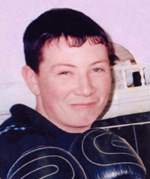 Jamie Curtin, from Limerick City, worked with horses. He was a very laid-back person, who although not athletic, was apparently healthy and had never spent time in hospital since birth. He loved horses and motorbikes, and was just ten days short of his 16th birthday when he died.
Jamie Curtin, from Limerick City, worked with horses. He was a very laid-back person, who although not athletic, was apparently healthy and had never spent time in hospital since birth. He loved horses and motorbikes, and was just ten days short of his 16th birthday when he died.
Date of death: December 2004
Age at time of death: 15
Prior symptoms: None
Circumstances of death: Jamie collapsed while doing light work in the stables, tending horses. His friend thought he had fainted, and brought him to the hospital where Jamie was pronounced dead.
Diagnosed cause of death: “SADS”
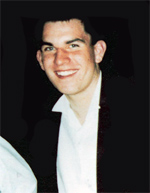 Ross Cooney, from Limerick, was a first-year Business Studies student at the University of Limerick. Ross was an only son, with one younger sister. He was a young man of many talents: he was a skilful debater, a qualified lifeguard, and a holder of a Chief Scout Award, and standing 6’4” tall he was a promising athlete. He is equally remembered as a lovable character, with a bright and bubbly personality and a high regard for others. Ross’s life was cut short while representing his university at the National Basketball Arena in Tallaght, in an intervarsities tournament. He died suddenly on court when the team had just started a match.
Ross Cooney, from Limerick, was a first-year Business Studies student at the University of Limerick. Ross was an only son, with one younger sister. He was a young man of many talents: he was a skilful debater, a qualified lifeguard, and a holder of a Chief Scout Award, and standing 6’4” tall he was a promising athlete. He is equally remembered as a lovable character, with a bright and bubbly personality and a high regard for others. Ross’s life was cut short while representing his university at the National Basketball Arena in Tallaght, in an intervarsities tournament. He died suddenly on court when the team had just started a match.
Date of death: November 1999
Age at time of death: 18
Prior symptoms detected: none
Diagnosed cause of death: Sudden Adult Death Syndrome (unexplained).
WATERFORD
Kieran Clancy, from Ballysaggart, Lios Mór, was a self-employed carpenter by trade and also a part-time farmer. He was married to Úna. He is described by his family as “the picture of health and as strong a man as you could ever meet”. He was a committed member of the Ballysaggart GAA club and played for the club hurling team at full-back, the position in which he played on the night he died.
Date of death: April 2003
Age at time of death: 31
Prior symptoms detected: None
Circumstances of death: Kieran felt a pain during a hurling game and had to go off the field. He had died by the time he got to hospital.
Diagnosed cause of death: Kieran died due to what was described as a ‘congenitally weak aorta’. Despite his apparent strength and sturdy physique, the aorta, which was tissue-like in structure, was simply not sturdy enough and unravelled to ultimately result in Kieran’s demise.
.
.
.
http://www.TheCormacTrust.cOM/sudden-cardiac-death-irelandSWEET RELIEF ... SWEET DREAMS
REFERENCES ...
'non-diabetic adults are more affected by HYPOglycemia than people
with type 1 diabetes'
www.ncbi.nlm.nih.gov/pubmed/18709352
__________________________
'potential role of defibrillator associated stresses in distress
induced cardiac death'
www.ncbi.nlm.nih.gov/pubmed/18827773
__________________________
'fibrillation cured by glucose/dextrose'
www.NicholasDynesGracey.blogspot.cOM/2008/06/fibrillation.html
__________________________
Anaesth Intensive Care. 2000 Dec;28(6):698-700.Links
Ventricular arrhythmias associated with HYPOglycemia.
Chelliah YR.
Department of Anaesthesiology, Tan Tock Seng Hospital, Jalan Tan Tock
Seng, Singapore.
HYPOglycemia commonly manifests as increased sympathetic discharge or
as neuroglycopenia in the awake patient. This case may represent an
example of the effect of HYPOglycemia on the heart giving rise to
ventricular tachycardia, which promptly resolved at the time of
correction of HYPOglycemia.
www.ncbi.nlm.nih.gov/pubmed/11153301
_________________________
Afr J Med Med Sci. 2008 Jun;37(2):161-3.
HYPOglycemia as a possible cause of transient ischaemic attack in a
Patient with multiple vascular risk factors.
Okeahialam BN.
Department of Medicine, Jos University Teaching Hospital, Jos, Plateau
State, Nigeria. basokeam@yahoo.com
An elderly, fibrillating, diabetic hypertensive Patient in heart
failure is at risk of stroke from all her cardiovascular morbidities.
When such a Patient presents with stroke, it is usually difficult to
squarely incriminate one. Consequently, precious time is lost while
care Givers conduct expensive investigations to make a definitive
diagnosis. This case report is on one such Patient, in whom
HYPOglycemia was a plausible cause. Treatment resulted in dramatic
recovery. Had neurological complication of drug induced HYPOglycemia
not been suspected, the hemiplegia might have become permanent; and
any of her risk factors given as a rational explanation. Therefore
when a Diabetic on treatment presents with stroke, care givers should
perform immediate blood glucose test to exclude HYPOglycemia; not
withstanding the existence of other risk factors.
www.ncbi.nlm.nih.gov/pubmed/18939400
_________________________
Eur Heart J. 2008 Jan;29(2):166-76. Epub 2007 Dec 21. Links
Comment in: Eur Heart J. 2008 Aug;29(16):2058; author reply 2058-9.
Eur Heart J. 2008 Jan;29(2):141-3.
The impact of glucose lowering treatment on long-term prognosis in
patients with type 2 diabetes and myocardial infarction: a report from
the DIGAMI 2 trial.
Mellbin LG, Malmberg K, Norhammar A, Wedel H, Rydén L; DIGAMI 2 Investigators.
Cardiology Unit, Department of Medicine, Karolinska Institutet,
Stockholm, Sweden.
AIMS: To explore the impact of glucose lowering treatment on prognosis
in diabetic Patients with myocardial infarction. METHODS AND RESULTS:
1181 type 2 diabetic Patients (mean age 68 years; 67% males)
discharged after myocardial infarction were followed (median of 2.1
years). At discharge, 436 Patients (37%) had oral glucose lowering
agents whereof 268 sulphonylureas and 200 metformin, while 690
Patients (58%) were on insulin. The impact of treatment was analysed
by an updated Cox proportional hazards regression model, correcting
for confounders. Cardiovascular mortality was not influenced by
metformin [Hazard ratio (HR) 0.93, 95% CI 0.60-1.43; P = 0.73],
sulphonylureas (HR 1.15, 95% CI 0.80-1.64; P = 0.45), or insulin (HR
1.05, 95% CI 0.75-1.46; P = 0.77). The risk for non-fatal myocardial
infarction and stroke increased significantly in patients on insulin
(HR 1.73, 95% CI 1.26-2.37; P = 0.0007), whereas this risk was lower
among those on metformin (HR 0.63, CI 0.42-0.95; P = 0.03) and
unchanged with sulphonylureas (HR 0.81, 95% CI 0.57-1.14; P = 0.23).
This finding remained analysing only patients with newly instituted
insulin and those randomly allocated to newly instituted insulin.
CONCLUSION: Controlling for confounders including glycemic control,
there was no significant difference in mortality between
sulphonylureas, metformin, and insulin. In this post hoc analysis, the
risk of non-fatal myocardial infarction and stroke increased
significantly by insulin treatment while metformin was protective. It
is emphasized that this observation is done in an epidemiological
analysis and should encourage to further confirmation in randomized
trials.
www.ncbi.nlm.nih.gov/pubmed/18156614
_________________________
Europace. 2008 Nov 6. [Epub ahead of print]
Endurance sport practice as a risk factor for atrial fibrillation and
atrial flutter.
Mont L, Elosua R, Brugada J.
1Thorax Institute, Hospital Clínic, University of Barcelona, Institut
d'Investigació Biomèdica August Pi i Sunyer (IDIBAPS), Villarroel 170,
Barcelona 08036, Catalonia, Spain.
Although the benefits of regular exercise in controlling
cardiovascular risk factors have been extensively proven, little is
known about the long-term cardiovascular effects of regular and
extreme endurance sport practice, such as jogging, cycling, rowing,
swimming, etc. Recent data from a small series suggest a relationship
between regular, long-term endurance sport practice and atrial
fibrillation (AF) and flutter. Reported case control studies included
less than 300 athletes, with mean age between 40 and 50. Most series
recruited only male patients, or more than 70% males, who had been
involved in intense training for many years. Endurance sport practice
increases between 2 and 10 times the probability of suffering AF,
after adjusting for other risk factors. The possible mechanisms
explaining the association remain speculative. Atrial ectopic beats,
inflammatory changes, and atrial size have been suggested. Some of the
published studies found that atrial size was larger in athletes than
in controls, and this was a predictor for AF. It has also been shown
that the left atrium may be enlarged in as many as 20% of competitive
athletes. Other proposed mechanisms are increased vagal tone and
bradycardia, affecting the atrial refractory period; however, this may
facilitate rather than cause the arrhythmia. In summary, recent data
suggest an association between endurance sport practice and atrial
fibrillation and flutter. The underlying mechanism explaining this
association is unclear, although structural atrial changes (dilatation
and fibrosis) are probably present. Larger longitudinal studies and
mechanistic studies are needed to further characterize the association
to clarify whether a threshold limit for the intensity and duration of
physical activity may prevent AF, without limiting the cardiovascular
benefits of exercise.
www.ncbi.nlm.nih.gov/pubmed/18988654
_________________________
JEMS. 2002 Nov;27(11):54-60.
"... Key role of glucose in 'coma cocktails' ... Using science to
dispel myths & improve patient care ..."
Bledsoe BE. bbledsoe@earthlink.net
"... EMS (emergency medical services) has evolved to a point where any
EMS provider should be able to reasonably determine the most likely
cause of coma, or, in a worst-case scenario, narrow the cause to but a
few possibilities. Certainly, patients with bona fide HYPOglycemia
should receive IV glucose. Because the consequences of prolonged
HYPOglycemia are severe, if there's a doubt about whether HYPOglycemia
is present, then glucose should be empirically administered ..."
www.ncbi.nlm.nih.gov/pubmed/12483195
_________________________
Anaesth Intensive Care. 2000 Dec;28(6):698-700.Links
Ventricular arrhythmias associated with HYPOglycemia.
Chelliah YR.
Department of Anaesthesiology, Tan Tock Seng Hospital, Jalan Tan Tock
Seng, Singapore.
HYPOglycemia commonly manifests as increased sympathetic discharge or
as neuroglycopenia in the awake patient. This case may represent an
example of the effect of HYPOglycemia on the heart giving rise to
ventricular tachycardia, which promptly resolved at the time of
correction of HYPOglycemia.
www.ncbi.nlm.nih.gov/pubmed/11153301
_________________________
J Assoc Physicians India. 1992 Oct;40(10):701.Links
Ventricular fibrillation with HYPOglycemia.
Sharma SN.
Cardiologist Institute of Aerospace Medicine, IAF Bangalore.
www.ncbi.nlm.nih.gov/pubmed/1307366
_________________________
Am J Med Sci. 1975 May-Jun;269(3):403-8.
'... HYPOglycemia induced ventricular tachycardia abolished by glucose
infusion ...'
Miley GB, Binnick SA, Block PJ.
We report the first case of adenocarcinoma of the stomach associated
with severe HYPOglycemia. Accompanying the profound HYPOglycemia, as
low as 5 mg per cent by the orthotoluidine method, were multiple
episodes of ventricular tachycardia which were abolished by glucose
infusion. Following surgical excision of a hemorrhagic portion of the
tumor, normoglycemia levels were achieved and ventricular irritability
was no longer present. The possible mechanisms of HYPOglycemia in
extrapancreatic tumors are discussed as well as a mechanism for
HYPOglycemic-induced ventricular tachycardia. It is postulated that
hemorrhage of a necrotic tumor may release large amounts of an
insulin-like substance and cause HYPOglycemic coma.
www.ncbi.nlm.nih.gov/pubmed/1155497
_________________________
Eur J Emerg Med. 2003 Dec;10(4):331-3. Links
Bradycardia related to HYPOglycemia.
Navarro-Gutiérrez S, González-Martínez F, Fernández-Pérez MT,
García-Moreno MT, Ballester-Vidal MR, Pulido-Morillo FJ.
Department of Emergency Medicine, Hospital Virgen de la Luz, Cuenca,
Spain. sergionavarrog@hotmail.com
Alterations in blood glucose levels are known to be involved in
electrocardiogram changes. Various types of arrhythmias have been
reported. We present here the case of an 81-year-old woman presenting
with transient atrial fibrillation while being treated for
hypoglycaemia with dextrose infusion, and finally developing a sinus
rhythm. The presence of alterations in glucose blood levels should
always be considered as a potential cause of transient atrial
fibrillation.
www.ncbi.nlm.nih.gov/pubmed/14676515
_________________________
EG page 77 of 86 ... if
plasma blood glucose sub 5.5mmol/l can contribute to
'fainting/seizure/coma', as suggested by the FMCSA, then why the lack
of attention to seeing that levels above 5.5mmol/l are maintained in
'emergency situations' associated with 'fainting/seizure/coma'?
.
www.FMCSA.dot.gov/documents/diabetesrpt.pdf
.
Plasma blood glucose = sub 100mg/dL = sub 5.5mmol/l = potential loss
of 'self-control' aka NO safe 'DRIVING' of your car / vehicle =
potential negative physiological consequences upon the Human body
including "... myocardial and cerebral ischaemia and occasionally
infarction
..." ...
.
www.ncbi.nlm.nih.gov/pubmed/18461635
.
www.en.wikipedia.org/wiki/Differential_diagnosis
_________________________










